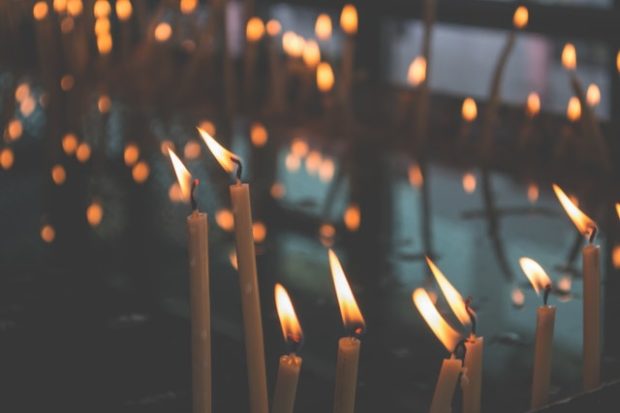You have no items in your cart. Want to get some nice things?
Go shopping
The first time that my mother went into morphine withdrawal, none of us knew what was happening. It was Christmas Eve. I was seventeen. I was in my second year at University, home for the holidays, and the three of us (myself, my sister, and my mother) were meant to sing with the choir that night, during the service.
I don’t remember how it started. One minute, I was sitting at the swaybacked kitchen table, reading my Cell Biology textbook to kill time until dinner, the next my sister was screaming and my brother and I were hurtling upstairs into our parents’ room to see what was the matter.
This was going to be the last year that my father served the church in Bradenton, though none of us kids knew it yet. In a few months, he would sign the contract taking him to Kansas and submit (with great relief) his resignation from the church we had attended for the better part of ten years.
His relief would be short-lived. The church in Kansas was a vicious place, though it would seem good, for a while. It was like an apple with a wasp living in it. My father would be paid, consistently, on time, and he would be given enough to actually live on for the first time in his career. Before everything there went to hell, my parents would be able to buy their first (and, so far, only) house. But that’s my father’s story, not mine, and I’m not going to tell it here.
Back in Bradenton, my brother and I thundered up the stairs and hung a hard right into the converted attic that our parents slept in. My father had ordered a new bed as my mother’s Christmas present, so their rock-hard, king-sized mattress was temporarily lying directly on the floor. My mother was spread out on top of their blue, fake-silk counterpane, her sweat-drenched body convulsing and trembling. She was in more pain than usual, obviously delirious; speaking to people who were not there, addressing empty corners, and her body hair was bristling like the pelt of an enraged dog.
By this point, my mother’d had an experimental morphine pump installed. This was a device (the size and shape of a tuna can) which lay under her skin and was designed to be filled in hospital once a month in order to dispense the medication that she needed at a constant rate. It was still in the testing stage (which meant that my father’s insurance would cover it) and, at first, it seemed to function perfectly.
She was able to stay out of bed for longer periods of time than she had since I was a very small child, and her mood was better, too. It didn’t feel so dangerous for me to be around her. I didn’t need to worry, for once, that anything I said would be twisted around as soon as it had left my tongue and passed on, warped, for my father to pass his awful judgement on.
Pain makes people meaner than they have to be. It is not a refinery. Let me tell you that, right now.
Anyway, my mother loved the relief but she hated the other effects. The pump was loaded with Fentanyl, a powerful opioid, that slowed her thoughts and made her gain weight. The surgery left her with another scar, and the pump itself protruded from her belly so much that it was visible through her clothes. My mother was used, even then, to being spoken of in the same breath as ‘beauty’. The act of being beautiful was central to her sense of self, and it was where she stored her value. It was difficult for her to lose another fragment of it.
The pump had worked well, for the first three months, but this time the nurse had underfilled it. She wasn’t due for another dose until January second. Her store ran dry on the morning of the twenty-fourth.
My little sister found our mother, thrashing and sweaty, made mad with nerve-pain and withdrawal, but she doesn’t remember any of the day from breakfast until the start of the Candlelight Service, when she joined me in the ranks of the choir. Katie sang alto. My mother tried to convince everyone that I was a ‘lyric soprano’, but I’m tone-deaf as a kettle, and I unconsciously alter the tune to fit whatever emotion that I’m feeling at the time, so that if I’m happy my dirges are chipper and, if I’m sad, my love-songs sound like something from a funeral for a drowned kitten.
Of course we went to church after the trouble was over. We couldn’t let anyone know that there was anything wrong. What on Earth would they think of us, if we did?
Back in our parents’ room, my brother knelt on the bed and grabbed hold of our Mother’s ankles. I took the other end (her head was clamped between my thighs in a parody of birth) and restrained her arms so that she would stop tearing at her limbs with her fingernails. By the time I got there, she’d dug long, red gouges in her arms and shins and her nails were rined in blood.
Katie stood, watching this, with her spine pressed against the closet doorknob, tears and snot running down past her lips, her chest emitting a low, terrified whine while our father shouted at us to be quiet so that he could hear the emergency responder at the other end of the line.
I remember all of this, clearly, as though through cool glass. I can feel my feverish forehead pressed against a surface, chilled and wet.
I felt completely numb while all of this was happening. I remember that. I remember how delicious it felt not to care. It was the first time in forever that I had been totally free of a shrieking anxiety.
I’m like this every time my mother nearly dies. It’s almost transcendent: a terror so complete that it passes over into stillness. It’s a sick and temporary fix, but it works. It’s that moment when the worst has happened and you’ve got nothing to fear any more.
Lately, I’ve found a better way of dealing with anxiety: I feel something close to relief while fencing, riding roller coasters, watching a really effective horror film, or otherwise thrill seeking. It’s the surge of adrenaline that does the trick of catapulting me into the cool, clear space which is the only benefit of extreme trauma, and through thrills and swordplay, I can use that calm to think without having to deal, afterwards, with an absolutely crushing altered state of reality.
I may not be all that psychologically healthy, but if you’ve read this far, you know that without my telling you.
My father was not allowed to ride in the ambulance with her. When they show the patient’s partner doing that in films and television, that’s a narrative cheat. There are a lot of drugs in ambulances, and addicts are opportunistic. My father followed my mother to the hospital in his neon-blue Mitsubishi Eclipse. We stayed at home to get dressed and clean the blood out of the sheets.
My siblings and I ate a quick dinner (microwave pizzas from Sam’s, with a chalupa crust) and I dressed in my purple velvet princess dress and did my hair in four long cornrows. When I was in the orphanage, before my hair was razored off (to prevent lice, they said) one of the African American girls I lived with got permission to use me as a practice head. She was studying to be a cosmologist. I was hers, to do with as she would, between the hours of three a.m. and four-thirty, before I had to report to the fields for planting or harvest. I picked things up.
My hairstyles were often incongruous, but I was oblivious of that. I didn’t know what I was saying, in that language.
All night long, people asked me if they were extensions.
As always, church was another world to us. We left our troubles at the door and picked them up again when we left.
Whenever anyone asked where our mother was, we said that she wasn’t feeling well. That’s what we told everyone the next day at the family gatherings, too. It was a lie which did good service.
Between us, as a family, we never talked about it. It was something that happened. We had to save face.
It wasn’t important. It just was.

About Bethany Pope
Bethany W Pope is an LBA winning author, and a finalist for the Faulkner-Wisdom Awards, the Cinnamon Press Novel competition, and the Ink, Sweat and Tears poetry commission. She placed third in the Bare Fiction Poetry Competition, second in this year’s Bristol Poetry Prize, long-listed for the Bare Fiction short-story contest, short-listed for The Arianne’s Thread Poetry Contest and she was highly commended in this year’s Poetry London Competition. Bethany was recently nominated for the 2014 Pushcart Prize. She received her PhD from Aberystwyth University’s Creative Writing program, and her MA from the University of Wales Trinity St David. She has published several collections of poetry: A Radiance (Cultured Llama, 2012) Crown of Thorns, (Oneiros Books, 2013), and The Gospel of Flies (Writing Knights Press 2014), and Undisturbed Circles (Lapwing, 2014). Her first novel, Masque, shall be published by Seren in 2016.



